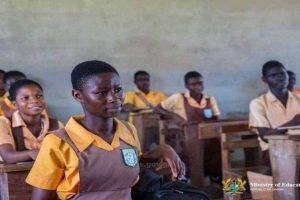The CSSPS review aims to strengthen its fairness, efficiency – MoE

The review of the Computerized School Selection and Placement System (CSSPS) is aimed at addressing persistent challenges in the placement system and strengthening its fairness and efficiency, the Minister of Education, Haruna Iddrisu, has said.
Speaking at the 32nd Annual National Conference of Directors of Education (CODE) in Sunyani, he said the Ministry of Education has set up a committee to review the Computerized School Selection and Placement System (CSSPS).
The formation of the committee to review the Computerized School Selection and Placement System, the Education Minister said, is chaired by the Headmaster of Mfantsipim Senior High School.
“We are reviewing the system to make it a more robust one that recognizes and rewards merit, not protocol. Our goal is to restore public trust in school placement and eliminate all forms of manipulation,” he said.
The Minister for Education also cautioned heads of various government second-cycle schools in the country to desist from turning away students placed in their school by the computer school placement.
He stressed that once a student has been placed in a school through the Computerized School Selection and Placement System (CSSPS), the school authorities are obliged to admit the student without delay or intimidation.
“No child should be turned away or denied enrolment once they are placed. The placement is a right, not a privilege. Heads of institutions must uphold fairness and ensure a smooth process,” he added.
The Ministry of Education (MoE) decision to review the computer school placement system comes after the Education Minister Haruna Iddrisu said the computer placement is not working well for the country.
“It means that the computerized placement system is not working well for the country, and I’m happy to review it, and I will review it,” he said during his visit to Presbyterian Boys’ Secondary School (PRESEC), Legon, on Monday, October 20, where he inspected facilities and assessed the school’s admission procedures.
Speaking to the authorities of the Presbyterian Boys’ Secondary School, the Education Minister said he will put together a committee to review the Computerized School Selection and Placement System (CSSPS) to make it fairer and more efficient.
“I’ll put in place a committee to review its performance over the decade, and then give me a credible alternative. What we need is meritorious admission. Nobody would accept that you get an Aggregate 6, and you can’t get the spot of your first choice. That’s unfair, and we’ll look very closely into that,” he said.
In other news, Africa Education Watch (EduWatch) has called on the Ministry of Education (MoE) to revert the Computerized School Selection and Placement System (CSSPS) to its original module rather than review the second-cycle school placement system entirely.
In a social media post sighted by Pretertiary.com, the Executive Director of EduWatch, Kofi Asare, stated that many issues blamed on CSSPS actually stem from inadequate school facilities, not the CSSPS itself.
“The 2024 CSSPS was fine; no need for another major review; just audit the 2025 performance and lessons. MoE should reschedule school selection to happen after BECE results and focus on expanding infrastructure in line with the direction of demand. We should be fine with effective implementation,” he said.
Speaking in an interview, he said the system should be restored to the 2024 module, which he described as superior to the current one, except for issues relating to the percentage of protocol allocation for public basic school students.
“We have not been calling for a review of the current placement system; what we have been calling for is a reversion to what existed prior to 2025. We believe that CSSPS, as existing per the 2024 module, was good except that the ministry announced a reduction in the protocol allocation for public basic school students from 30%.
That was the only thing that needed to be changed. Apart from that, we believe that the CSSPS is good, and the challenges that we raised about the system are normally issues related to the enforcement of existing protocols rather than reviewing the placement mechanism,” he said.



